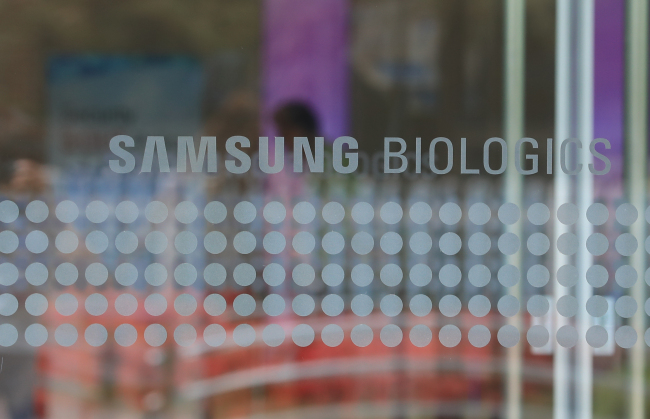South Korea’s top financial regulator will embark on initial steps to review accounting fraud allegations involving contract drug manufacturer Samsung BioLogics this week, the outcome of which will largely sway the company’s future prospects and legal standing.
The Financial Services Commission is set to review the closely-watched case on Thursday via an in-house accounting oversight panel, marking the first formal meeting on the issue. It will then refer the case to the Securities and Futures Commission for a final decision, set for May 23.
 |
(Yonhap) |
During the meeting, the FSC and Samsung BioLogics are expected to engage in a fierce debate over the legitimacy of evidence behind the allegations against Samsung Group’s biopharma production unit.
The planned deliberations follow the Financial Supervisory Service’s tentative conclusion announced on May 1 that the Samsung-owned contract drugmaker had violated accounting rules by inflating its net profit in 2015 ahead of its initial public offering the following year.
On the request of Samsung BioLogics, the FSC will be holding its Thursday meeting in a court-like format in which the FSS will present its arguments and evidence, which Samsung BioLogics will then refute with rebuttals.
To ensure transparency and fairness, the Korean financial regulator explained the panel members have not worked for Samsung companies in the past, and also do not have any family members related to Samsung.
The FSC has also required its panel members to pledge secrecy on the matters discussed in the deliberations, given the sensitivity of the information and its potential to influence the market, according to local news reports.
Given the high stakes involved, the case is most likely to require multiple deliberations before arriving at a final decision, meaning the entire procedure could take more than a month.
What’s at stake? During the meeting on Thursday, the FSS is set to tackle how Samsung BioLogics suddenly came to acquire net profit of 1.9 trillion won ($1.77 billion) in 2015 after posting four straight years of deficits since its foundation.
At the time, Samsung BioLogics had changed its accounting method to reflect its holdings in subsidiaries at fair market value, instead of at book value as was previously done, resulting in equity gains from its biosimilar-making unit Samsung Bioepis.
Under the new method, BioLogics perceived Bioepis as an affiliate, instead of a subsidiary, despite holding a 91.2 percent majority stake in Bioepis at the time. US-based Biogen had owned the remaining 8.8 percent stake.
Samsung BioLogics explained that the change reflected the high likelihood that Biogen would exercise a call option to raise its stake in Bioepis 50 percent minus one share, as the value of Bioepis had jumped on the regulatory approval of its copycat biologic drugs.
The call option, if exercised, would weaken Samsung BioLogics’ control over Bioepis. Therefore, accounting experts advised BioLogics to categorize Bioepis as an affiliate, in line with International Financial Reporting Standards, the firm said.
One of the points of debate has been the legitimacy of Samsung Biologics categorizing Biopis as an affiliate before Biogen’s execution of a call option. Some argue it was right to take into consideration the “potential voting rights” of Biogen, while others contend that there is evidence that Biogen had no will to exercise its call option at the time.
So far, Biogen has yet to exercise the option, which expires at the end of next month. However, Biogen’s chief financial officer Jeffrey Capello has confirmed the firm’s intentions during its
first-quarter conference call.
“In the coming months we plan to exercise our option to increase our equity stake in the Samsung Bioepis joint venture. We believe this is an attractive value creation opportunity,” Capello said.
In addition, the FSS is looking into whether Samsung BioLogics changed its accounting standards to boost its valuation in order to help facilitate a controversial merger in 2015 between Samsung C&T and Cheil Industries that allowed Samsung’s heir apparent Lee Jae-yong to tighten his control over the conglomerate.
Samsung BioLogics is 75 percent owned by Samsung Electronics and Samsung C&T, the group’s de facto holding company. There are suspicions that Samsung buoyed the value of BioLogics to justify the merger ratio -- a claim which BioLogics has strongly denied.
During a recent emergency press conference, Samsung BioLogics pleaded innocence and stressed that its actions were in line with local accounting laws, citing plans to sue if a decision it cannot accept is reached.
The contract drug manufacturer said it had obtained approval from the FSS as well as three major accounting firms, on adopting IFRS standards for its 2015 accounting books.
By Sohn Ji-young (
jys@heraldcorp.com)








![[Weekender] Korea's traditional sauce culture gains global recognition](http://res.heraldm.com/phpwas/restmb_idxmake.php?idx=644&simg=/content/image/2024/11/21/20241121050153_0.jpg)